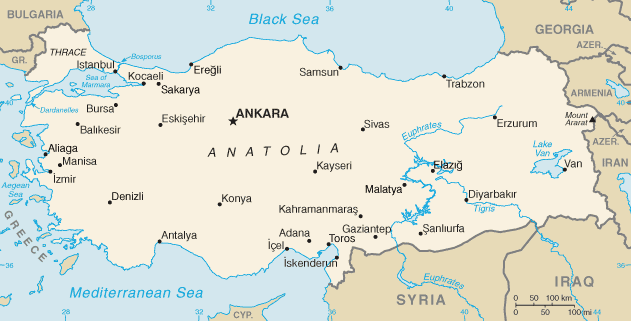This is an old revision of this page, as edited by Jorge Stolfi (talk | contribs) at 15:47, 22 April 2004 (fixed ethnic/linguistic status. Plese note that (1) Indo-European is not European (2) Language does not mean race, culture, or ethnicity (3) conquest does not mean replacement). The present address (URL) is a permanent link to this revision, which may differ significantly from the current revision.
Revision as of 15:47, 22 April 2004 by Jorge Stolfi (talk | contribs) (fixed ethnic/linguistic status. Plese note that (1) Indo-European is not European (2) Language does not mean race, culture, or ethnicity (3) conquest does not mean replacement)(diff) ← Previous revision | Latest revision (diff) | Newer revision → (diff)Anatolia (Greek anatole for "rising of the sun" compare "Orient" and "Levant"), also called by the Latin name of Asia Minor, is a region of Southwest Asia which corresponds today to the Asian portion of Turkey (Turkish: Anadolu).
Because of its strategic location at the intersection of Asia and Europe, Anatolia has been a cradle for several civilizations since prehistoric ages, with neolithic settlements such as Catal Höyük (pottery neolithic), Cayönü (PPN), Nevali Cori (PPN B), Hacilar (pottery neolithic) and Göbekli Tepe (PPN A) and Mersin. The settlement of Troy starts in the Neolithic, but continues up into the Iron age.
Major civilizations and peoples that have settled in or conquered Anatolia include the Hattians, Hittites, Phrygians, Cimmerians, Lydians, Persians, Celts, Tubals, Meshechs, Greeks, Pelasgians, Armenians, Roman Empire, Goths, Kurds, Byzantine Empire, Seljuk Turks and Ottoman Empire. These peoples belonged to many varied ethnic and linguistic traditions. Anatolians have spoken both Indo-European and Semitic languages, as well as many languages of uncertain affiliation. (Some authors have proposed that Anatolia could well have been the center from which the Indo-European languages have radiated).
Today the ihnabitants of Anatolia are mostly Turkish speakers, due to the conquest of Anatolia by Turkic peoples (and subsequent Islamification) in mediaeval times. A significant Kurdish ethnic minority exists in the southern regions, next to the frontiers with Iraq and Iran.
